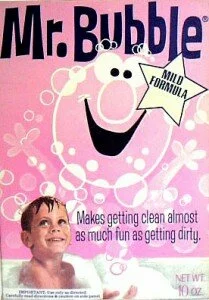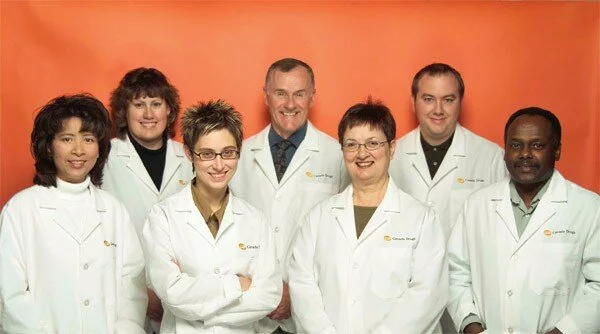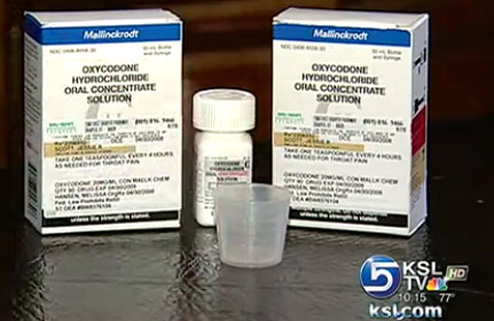From the Raleigh News & Observer via the Consumer World blog, here are nine tips for becoming a smarter consumer:
1. Haggle.
2. Check for discounts.
3. Complain more.
4. Read the fine print.
5. Do your homework and get second opinions.
6. Get help.
7. Save for a rainy day.
8. Plan for retirement.
9. Maintain your car.
Go here for the full article.
To become a smarter consumer of prescription drugs, we encourage you to get help by doing your homework at eDrugSearch.com, and to read the fine print before buying a prescription medication from any online pharmacy that’s not in the eDrugSearch.com system.
Remember: being a smart drug consumer is important to both your wallet and your health.
Got this one in the inbox today. It just screams credibility, doesn’t it?
I’m sure we don’t need to remind our readers of this, but just in case a new visitor doesn’t already know this: NEVER RESPOND TO A SPAM SOLICATION OF ANY KIND OVER THE INTERNET — ESPECIALLY FROM AN ONLINE PHARMACY! You’re putting both your money and health at risk if you do.
Happy holidays, everyone.
 Alex Sicre, who I follow on Twitter, sent me a note to remind me that H.R. 6353 had passed in the House of Representatives last week. It was received in the Senate last Thursday and is expected to pass there as well.
Alex Sicre, who I follow on Twitter, sent me a note to remind me that H.R. 6353 had passed in the House of Representatives last week. It was received in the Senate last Thursday and is expected to pass there as well.
In the face of Congress’ apparent bumbling of the $700 billion financial bailout package, I’m glad to know that something useful can still emerge from the lawmaking process.
H.R. 6353 is named for Ryan Haight (pictured), who died of an overdose of Vicodin after ordering the pills over the Internet without a prescription. (You can read more about Ryan here.)
You can read the full text of the legislation here; here’s a summary of its provisions:
- Amends the Controlled Substances Act to prohibit the delivery, distribution, or dispensing of controlled substances over the Internet without a valid prescription. Exempts telemedicine practitioners.
- Defines “valid prescription” as a prescription that is issued for a legitimate purpose by a practitioner who has conducted at least one in-person medical evaluation of the patient.
- Adds definitions to the Controlled Substances Act relating to online pharmacies and the issuance of prescriptions over the Internet.
Imposes registration and reporting requirements on online pharmacies. - Authorizes the Attorney General to issue a special registration under this Act for telemedicine practitioners.
- Increases criminal penalties involving controlled substances in Schedules II, IV, and V of the Controlled Substances Act.
- Authorizes states to apply for injunctions or obtain damages and other civil remedies against online pharmacies that are deemed a threat to state residents.
Keep in mind that licensed Canadian pharmacies do not ship controlled substances into the U.S., so this act applies to rogue pharmacies, both in the U.S. and worldwide. We applaud the Ryan Haight Online Pharmacy Consumer Protection Act — because the more that is done to protect Americans against rogue pharmacies, the more they will look to the many benefits that legitimate online pharmacies have to offer.
When you’re on the right side of an argument, people with a vested interest in defeating you will try almost anything to win. So it is with the big-money opponents of Canadian drug reimportation, who have been pulling out all the stops to convince Americans that buying medications from properly licensed Canadian pharmacies is unsafe.
The No.1 tactic that Big Pharma-backed groups are currently using is to employ clever rhetoric to lump licensed Canadian pharmacies in with dangerous rogue pharmacies — criminal organizations that operate in the shadows.
We’ve obviously written on this topic before, but over the weekend it hit close to home — as John Horton, former Bush White House aide and founder of a Web site called LegitScript — called into question the practices of one of our member pharmacies, CanadaDrugs.com. You can see Horton’s charges in the comments here.
Horton specifically states that CanadaDrugs.com “isn’t getting its drugs from Canada, but in fact from Turkey, which is a transshipment point for counterfeit or adulterated drugs.”
Remember what I was saying about clever rhetoric? This is a brilliant example of it, because it insinuates that CanadaDrugs.com is doing something wrong — without a shred of evidence to support this insinuation.
Here are the facts, as per CanadaDrugs.com:
- CanadaDrugs.com operates a fully licensed Canadian pharmacy.
- CanadaDrugs.com is a marketing portal that allows consumers to place orders with licensed dispensaries around the world. When you view the detail for a product page, it clearly states which dispensary will be filling the order for that particular package.
- CanadaDrugs.com works with companies like U.K. Pharmacy Services, which is based (and licensed) in the U.K. to fill orders for medications based in the European Union.
- U.K. Pharmacy Services dispenses medications under U.K. pharmaceutical laws and regulations that oversee the safety and efficacy of the dispensing practices and products sold to consumers. Turkish medications are dispensed in some cases, as is consistent with U.K. pharmaceutical law and in keeping with the standards of practice for U.K. pharmacies. This has been a common practice in the U.K. for many years, and is regulated by the British government.
- PharmacyChecker ensures that all CanadaDrugs.com dispensaries are duly licensed in their respective jurisdictions and that CanadaDrugs.com follows guidelines to ensure the safety of online consumers purchasing pharmaceutical products.
In summary: You have nothing to fear from CanadaDrugs.com, according to PharmacyChecker and according to the Canadian government.
John Horton also mentions the case of RxNorth, which is an odd one. My understanding is that RxNorth was never charged with a single crime and that the medication lot number that supposedly included counterfeit drugs was never identified by the FDA. RxNorth was never shut down, either. In fact, it was sold to CanadaDrugs.com.
Andrew Strempler, the founder of RxNorth and a licensed pharmacist, has certainly never hidden in the shadows, either. He’s been a public figure for years, profiled in the New York Times, Fortune and the Wall Street Journal. He’s easy to find if the authorities have evidence that he’s done something wrong; you can track him down through his LinkedIn profile or his blog if you’d like.
One final point: John Horton strongly suggests that Canadian authorities don’t particularly care whether the drugs its pharmacies ship to U.S. residents are safe or not. In other words, the licensing process that Canadian provincial governments use to approve and regulate online pharmacies is a sham.
Does anyone buy this argument? If so, remember: There is not, to my knowledge, a single documented instance of a U.S. consumer being harmed by the wrong drug, or an adulterated drug, shipped by a properly licensed Canadian pharmacy. This is pretty amazing — especially when you consider that even U.S. pharmacies make mistakes from time to time.
 The first six words of Andy Greenberg’s Tuesday story in Forbes are about all I needed to read: “In the shady world of online pharmacies…”
The first six words of Andy Greenberg’s Tuesday story in Forbes are about all I needed to read: “In the shady world of online pharmacies…”
Oh boy — here we go again.
Hey, I know there are a lot of rogue pharmacies out there. That’s why I started eDrugSearch.com — to help people avoid rogue pharmacies. But there are licensed, legitimate online pharmacies out there, too — and it’s not fair to consumers to scare them away from the Internet as an avenue for purchasing prescription drugs.
If you know what you’re doing, it’s relatively easy to be safe when you buy prescription drugs online. Here are two ways:
1. Use eDrugSearch.com, which only permits prescreened, licensed pharmacies in its database.
2. If you would rather search on your own, follow these five tips.
The main problem I have with the Forbes piece is that it suggests that virtually all online pharmacies don’t require prescriptions, sell counterfeit medications, and send you spam e-mails. Then it suggests that these same pharmacies are spending lots of money in search marketing and other forms of advertising on the Web. Both of these assertions are patently false.
For an online pharmacy to advertise through Google AdWords, for example, it must meet specific criteria that includes verification of its licensing by PharmacyChecker. Online pharmacies that send spam e-mails and distribute counterfeit medications need not apply.
The article is another bit of alarmism compliments (directly or indirectly) of Big Pharma’s PR machine — which is fighting tooth and nail against both access to Canadian drugs by U.S. consumers and the preferred means of this access, the Internet.
Don’t believe the hype.
 The National Center on Addiction and Substance Abuse at Columbia University (CASA), last week issued a fascinating survey of teens. Two results stood out to me:
The National Center on Addiction and Substance Abuse at Columbia University (CASA), last week issued a fascinating survey of teens. Two results stood out to me:
1. Teens (aged 12 to 17) indicated, for the first time, that it is easier to acquire “prescription drugs such as OxyContin, Percocet, Vicodin or Ritalin, without a prescription” than it is to buy beer.
2. While Internet pharmacies have been widely blamed for the increase in prescription drug abuse, few of the teens surveyed say that the drug abusers acquire their drugs from online pharmacies.
That’s right. Here’s what CASA’s press release says:
When teens who know prescription drug abusers were asked where those kids get their drugs:
- 31 percent said from friends or classmates;
- 34 percent said from home, parents or the medicine cabinet;
- 16 percent said other;
- Nine percent said from a drug dealer
You may recall that just last month, CASA issued a study warning that 85 percent of online pharmacies do not require a prescription. Clearly, the organization is strongly opposed (as we are) to rogue Internet pharmacies.
But I think it’s telling here that — even with all the negative media attention that Internet pharmacies are receiving — these kids didn’t say, “We buy our OxyContin online.” They said they’re sneaking pills from their parents’ medicine cabinets — or their friends’ parents’ medicine cabinets.
This says to me that we need to look beyond the easy scapegoat of Internet pharmacies in getting to the root of the problem of teen prescription drug abuse.
Could it be that the billions of dollars drug companies have spent to advertise, promote and sell their drugs have resulted in a flood of pills on the market?
Could it be that we’re taught by wall-to-wall direct-to-consumer advertising today that there’s “a pill for every ill”?
In this environment, isn’t it reasonable for teens to seek out the much-hyped prescription drugs they keep hearing about?
Let me give you one example. Viagra is a very popular drug among young men, including even teens, who are not impotent but believe that Viagra will improve their sexual performance. Do you think — for even a minute — that Viagra abuse would be as severe if Pfizer had not spent millions of dollars shouting “Viva Viagra” from every rooftop in America?
If you do, you’re kidding yourself. And if you think the problem of teen prescription drug abuse will be solved by focusing on Internet pharmacies rather than the larger issues at work, you’re also kidding yourself.
Medical Web Services, an Internet pharmacy operation that ran 70 Web sites, was busted this week in Cedar Rapids, Iowa — and the feds are seeking $41 million in proceeds from the alleged rogue operation.
What were these Web sites doing illegally? Allegedly, they were distributing Schedule III and Schedule IV substances via online questionnaires. According to the indictment, which named six participants in the operation:
Internet customers logged onto one of the domain names owned, operated, hosted, or linked to Medical Web Services and placed orders for prescription drugs. The customers completed a short health history questionnaire and provided credit card payment information. The customers’ identities were not verified, nor were customers required to submit any medical records, as part of the ordering process. . . . The doctors approved the prescription drug orders without examining any of the customers, and in the vast majority of cases, without reviewing any medical records.
Read the AP story and the U.S. Department of Justice press release.
You can also find more information on the case at attorney Benjamin Gluck’s Internet Pharmacy Law blog.
And to find a legitimate Internet pharmacy, go here.

The Florida Times-Union, the newspaper of Jacksonville, FL, published an editorial today headlined, “Internet Pharmacies: A prescription for death.”
We’re not crazy about that headline, as you might imagine. We’ve worked very hard to get the news media to distinguish legitimate, licensed Internet pharmacies from dangerous, rogue pharmacies in their coverage. But you know how it is.
In any case, we were pleased that the Times-Union’s editorial used one of our blog posts to illustrate the seriousness of the problem of prescription drug abuse. The relevant excerpt:
Most people know that Elvis Presley and Marilyn Monroe both died from an overdose of prescription drugs.
Judy Garland also succumbed to a prescription drug overdose – as did Howard Hughes and Anna Nicole Smith, reports eDrugSearch.com, a medication advocacy site.
Then, there was Paige Summers. The Web site says she was 1998 Penthouse Pet of the Year.
Five years later, she was killed by an overdose of codeine and oxycodone.
For those who haven’t read it, here’s the full blog post on celebrity prescription drug overdoses.
No matter how much we try to protect ourselves from unsafe drugs and pharmacy practices, errors can and do occur. The Consumerist reports that a Utah teen was in ICU for 16 days after a Wal-Mart pharmacist gave him the wrong prescription for his strep throat.
Jessie Scott’s doctor had ordered a liquid solution of oxycodone hydrochloride to treat Scott’s pain — but the pharmacist gave him a concentrated solution, which caused Scott to consume 20 times the prescribed dose of the medication.
Ultimately, we have to trust our pharmacists — online or off — to do what they’ve been trained to do. But I would add that in my experience, when a liquid medication is concentrated — as stated on the box label, above — it calls for being diluted. This should be enough of a red flag to double check with the doctor before taking the medication.
I’m not saying this to criticize the victim in this case; what happened to him is absolutely inexcusable. But we should always try to learn from instances like this.
One of the messages I’ve been trying to communicate since I started this blog nearly two years ago is that, ultimately, you’ve got to look out for yourself when it comes to your health. Because no one cares as much about it as you do.
A new report by the National Center on Addiction and Substance Abuse at Columbia University (CASA) underscores the results of other recent online pharmacy studies – showing that’s it’s too easy to buy prescription drugs, including controlled substances, without a prescription online.
Only 15 percent of 365 sites examined in the study required a prescription. According to Reuters, CASA recommends that the United States negotiate treaties with other governments to shut down illegal Internet trafficking of prescription drugs.
In April, the U.S. Senate passed a bill that included tougher regulation for online pharmacies — but the legislation is still awaiting action in the House.
You can download the CASA report here.
And if you’re looking for a legitimate, licensed Canadian or other international pharmacy, check out eDrugSearch.com’s prescreened list of safe online pharmacies.
Here’s a CBS News report based on the CASA study:
-
-
Search Blog Posts
-
Save Even More Money!
-

-
Trending Content
-
Watch our YouTube Video
-
Categories
Big Pharma Buy prescriptions online Canadian drugs Drug costs Drug reimportation Drug safety eDrugSearch.com FDA Health 2.0 Healthcare100 Healthcare blogs Healthcare solutions Low-cost drugs Medicare Part D Merck Online pharmacies Online pharmacy safety Pfizer Pharma bloggers Pharmaceutical companies Pharmaceutical marketing Pharma cheerleaders Prescription drug abuse Prescription drug prices Prescription drugs Prescriptions Wal-Mart drug plan -
Blogroll
- Bullet Wisdom
- Bulverde Business Directory
- Christian Counseling San Antonio Tx.
- Christian Schools in San Antonio Texas
- Christian Social Network
- Christians United for Israel
- DrugWonks.com
- Eye on FDA
- GoozNews
- Health 2.0
- Hunting Forum
- In the Pipeline
- Jesus Christ Our King
- John Hagee Ministries
- Kevin, M.D.
- Local Search Marketing
- My $299 Website
- Pharm Aid
- Pharma Marketing
- PharmaGossip
- Pharmalot
- San Antonio Asphalt
- San Antonio Life Insurance
- San Antonio Pressure Washing
- Storage New Braunfels Tx
- Texas Wildlife Supply
- The Angry Pharmacist
- The Health Care Blog
- The Peter Rost Blog
- World Vision
-
Tags
big pharma Canadian drugs canadian pharmacies canadian pharmacy consumer reports craig newmark divine healing Drug costs drug prices Drug reimportation eDrugSearch.com FDA Fosamax Generic drugs healing scriptures Health 2.0 healthcare reform Hypertension Jehova Rophe Jesus Christ Lipitor Metformin miracles nabp online pharmacy dictionary online prescriptions osteoporosis peter rost Pharmacies pharmacists pharmacychecker pharmacy spam phrma Prescription drugs prescription medication Proverbs 3:5-8 reimportation relenza Roche saving money SSRI swine flu Tamiflu The Great Physician The Lord our Healer -
Recent Tweets
- eDrugSearch Blog Rank on the Healthcare100: http://t.co/VJprL4LZWl [#]
- New blog posting, How to Get Prescription Medication Without Health Insurance - http://t.co/1ZdLavB87d [#]
- 10 Tips for Safer Prescription Drug Use http://t.co/GFnMIN1mCy [#]
- New blog posting, How to Beat High Drug Prices By Comparing Low Cost Pharmacies - http://t.co/fsZ0stNZme [#]
-
Archives
-
Recent Comments
- Heather Sturges on What is the Difference Between Effexor and Cymbalta?
- Lupe Machol on Cost of diabetes drugs has nearly doubled
- Manpower For Hospital In Pune on Why is Medicine Cheaper in Canada?
- Jen on How a Canadian Pharmacy Can Help You Offset Drug Price Hikes
- nino iarajuli on Vending machine dispenses prescription drugs


